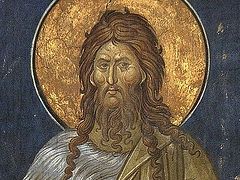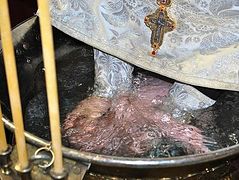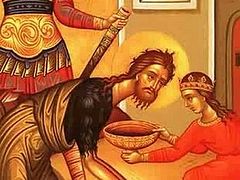Today the Orthodox Church commemorates the Conception of St. John the Baptist by his holy parents, Prophet Zachariah and Righteous Elizabeth.
Why do we call St. John the Baptist the “Forerunner”? To what repentance did he call the Jews, and what do his words mean to us today? Archpriest Igor Gagarin, a former school teacher and, since the early 1990s, a cleric of the Moscow (regional) Diocese, reflects on these questions.
He was a burning and a shining light (Jn. 5:35)—this is how the Lord Himself characterized St. John the Baptist, whose Conception is commemorated on September 23/October 6. We too are all called to “burn and give light”, but so few succeed in this! That is why our souls are drawn to “those few” in order to become just a little warmer and brighter through our contact with their fire. That is why people flocked to St. John in multitudes when, having gained enormous spiritual power through fasting and prayer, he came out of the desert to preach. His message boiled down to a few words: Repent ye, for the Kingdom of Heaven is at hand (Mt. 3:2). We call him the Forerunner because he preceded Jesus Christ. His mission was to prepare people for the meeting that had been anticipated by humanity for many centuries before him, the meeting that each human soul had sought, whether consciously or unconsciously. And indeed many still seek it today. For very many people their meeting with Jesus Christ is yet to take place. Therefore, the words repent ye, for the Kingdom of Heaven is at hand are very relevant in our days as well.
But what did St. John mean by calling people to repent? Today many believe that repentance means becoming conscious of our sins and acknowledging them at confession with a firm intention not to commit them again. That is right. This is what those who came to St. John to be baptized did. People would publicly confess their sins and then enter the waters of the River Jordan to be cleansed. But many felt that it was not enough. Washing away the shameful stains of a former life from our conscience is only half the job. How should we live after this? Bring forth therefore fruits meet for repentance (Mt. 3:8), St. John replies. Because, Now also the axe is laid unto the root of the trees: every tree therefore which bringeth not forth good fruit is hewn down (Lk. 3:9).
But what good fruits? What should we do to ensure that our repentance becomes a total change of our life and not a mere attempt to flee from the wrath to come (Mt. 3:7)?
The answer of St. John the Baptist was brief and clear: He that hath two coats, let him impart to him that hath none; and he that hath meat, let him do likewise (Lk. 3:11). In other words, be generous, be kind, be merciful, help others, share, and do good works. Or, as had been proclaimed many centuries before and afterwards repeated by the Savior, Thou shalt love thy neighbour as thyself (Mt. 22:39). Without the fruits, repentance is defective, it falls short of its aim and doesn’t lead us to Christ.
On the face of it, St. John’s preaching sounds stern and threatening. O generation of vipers, who hath warned you to flee from the wrath to come? (Mt. 3:7). But if we listen to his words more attentively, we will see how moderate his demands are and how lenient towards our weaknesses this man is. He doesn’t demand that we share our last penny or give our shirt off our back. He that hath two coats, let him impart to him that hath none. His command is so much milder than the one Christ later addressed to the rich young man: One thing thou lackest: go thy way, sell whatsoever thou hast, and give to the poor, and thou shalt have treasure in heaven: and come, take up the cross, and follow Me (Mk. 10:21). However, this call of the Savior is addressed not to everyone, but to a few chosen people—to those whom He particularly loved (cf. Mk. 10:21) and calls to a special service. Meanwhile, St. John addresses everybody. Giving up the last bit is the lot of great souls, while everyone can and should share. If every human being were guided by this simple rule, would anyone on our planet be left without shelter, clothes, and food?
I will repeat myself: St. John’s uncompromising stance goes remarkably well with his lenience. He doesn’t lay heavy burdens and grievous to be borne (Mt. 23:4) on anyone’s shoulders. The way he treats publicans (whom all of their fellow-countrymen loathed and held in utter contempt according to their deserts) is remarkable too. They would collect taxes for the Roman Emperor, whose authority was hateful to the Israelites. More than that, a large portion of this money (levied from people) would end up in their pockets, so they were well-to-do people. It would seem logical that, while denouncing the vices, St. John should above all have jumped on the publicans. It must have been so hard for them to bring themselves to come to the banks of the Jordan. But they too came and asked: Master, what shall we do?, and he said to them, Exact no more than that which is appointed you (Lk. 3:12-13). And he didn’t say a word about the sinful nature of their occupation!
And what St. John said to the soldiers who came to him to be baptized is still more remarkable. What kind of soldiers were they? These were the Roman soldiers and conquerors. They were the enemies who had taken control of the Israelites’ fatherland and were hated by the whole nation. Very many Israelites dreamed of a revolt and a war of liberation (which they would ultimately begin a few decades later!) and expected the future Messiah to head the overthrow of the Romans. Those soldiers were pagans, not Jews. Even getting into contact with them was considered defilement for faithful Jews. It would seem that the prophet, who was never afraid of anyone, should have met them in a most formidable way. But what did he say to them? And the soldiers likewise demanded of him, saying, And what shall we do? And he said unto them, Do violence to no man, neither accuse any falsely; and be content with your wages (Lk. 3:14). St. John well understood that soldiers were dependent people. Service is service. And, though the nature of that service was abominable to every Israelite, including St. John himself, it couldn’t be helped! In this sense St. John wanted to say to both publicans and soldiers that while it was not in their power to change the situation, they were able to remain human beings in it—kind, just, upright and merciful. In connection with this I cannot help but recall the account of the Austrian psychiatrist Viktor Frankl, according to which the commandant of a Nazi camp, as it turned out later, would spend his wages on medication for the camp inmates.
This is what the preaching of St. John the Baptist was like. On the one hand, he was stern and exacting. And, on the other hand, as a human being he understood our real capacity and showed no sign of maximalism or radicalism.
There are two opposite attitudes. The first of them was vividly expressed by the Norwegian playwright Henrik Ibsen in his epic drama, Brand—a priest who forces himself beyond compromise and of whom God demands “all or nothing”.
The other attitude is as follows: “Since I won’t be able to do everything, I will do nothing.” Both were alien to St. John the Baptist. His message is that if you cannot change everything in your life, then change what is within your power. I believe each one of us has the strength to do this. And I will add from myself that we shouldn’t stop at what has been achieved and rest on our laurels, but should always strive for more. For repentance is not a one-off effort; rather, it is constant growth and progression towards perfection.




